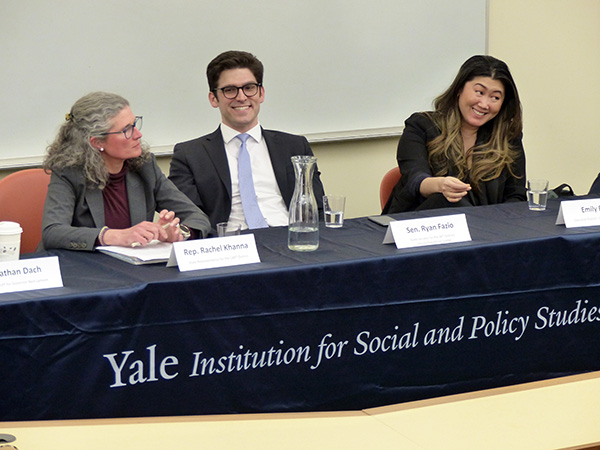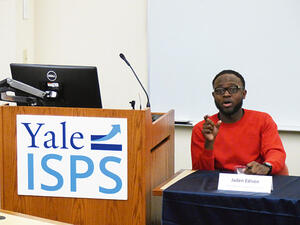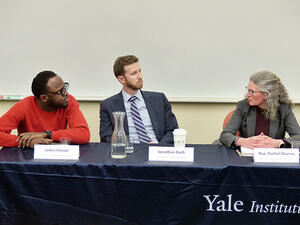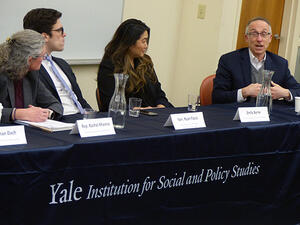Guiding Policy: ISPS Hosts State Politicians, Scholars, and Journalists to Discuss Data-Driven Decision-Making

Good decisions require good data.
On Monday, Connecticut politicians, journalists, and scholars gathered at Yale’s Institution for Social and Policy Studies (ISPS) to discuss the new policy landscape in the state and how scholars and students can help inform policy decisions at the Capitol in Hartford.
Co-sponsored by ISPS, the Scholars Strategy Network of Connecticut (SSN), and the Carol and Gene Ludwig Program in Public Sector Leadership at Yale Law School, the event was convened by Jacob Hacker, Stanley B. Resor Professor of Political Science and a resident faculty fellow with ISPS. It featured Emily Byrne, executive director of Connecticut Voices for Children; Jonathan Dach, (Yale College ‘08, Yale Law School ‘13), chief of staff for Gov. Ned Lamont; Ryan Fazio, state senator for the 36th District and deputy Republican leader; Rachel Khanna, Democratic state representative for the 149th District; and Bruce Putterman, CEO and publisher of The Connecticut Mirror. Jaden Edison, justice reporter at the Mirror, moderated the conversation.
“We have scholars in criminal justice, tax policy, housing inequality,” Hacker said to introduce the event. “If there is a problem facing our state, there is probably someone at Yale studying it — or at the many other institutions that are a part of the Scholars Strategy Network.”
ISPS is a community of interdisciplinary social scientists working to understand critical challenges in the world and support democratic, data-based solutions.
Edison asked the panel to discuss their thoughts on how the state could benefit more from collaboration with scholars. Byrne spoke of how working for change in systems and policy requires different actors filling different lanes, noting that the staff of Connecticut Voices for Children are researchers and advocates, not journalists, elected officials, activists, or philanthropists.

“And so for us, we know that when we advocate for, enact, and resource a patchwork of research-based equitable policies, we do in fact get closer to the future that we want,” Byrne said. “Every single actor in this space in every single lane is super important. But as researchers and advocates, our job is to power the movements with data, to organize and work with community where there is a need and where it makes sense, and then to partner with values-aligned organizations, in our instance, to advance economic justice.”
Fazio, whose district includes Greenwich, Stamford, and New Canaan, said that members of the part-time legislature rely on staff, scholars, and advocates to inform policymaking, particularly when they supply specific, substantive, practical information.
“If you have a bill and you have a good reason for the bill — and normally the narrower it is in scope — then it really does substantially increase its likelihood for passage and bipartisan support,” he said.
Khanna, a first-time state legislator who defeated incumbent Kimberly Fiorello in November to represent Greenwich and Stamford, said she appreciates data and analysis for subjects in which she is not an expert. In addition, she said Connecticut can learn a lot from other states or countries that may have already tackled a similar issue.
“There’s no point reinventing the wheel,” she said. “People have figured this out. It’s just finding a way to adapt it to our purposes.”

Edison also asked the panel to talk about the state legislature’s tendency for incremental change when members of the public might demand faster, bolder action.
Dach said that incrementalism could be a problem if it led parties to remain stuck on a previous agreement even as subsequent research or the experience of other states shows a better way. However, he said that incremental change can be a healthy product of compromise and a sign of positive change.
“Incrementalism in most cases satisfies the parties who came to the table asking for more,” Dach said. “Progress is better than no progress.”
Byrne called for state leaders to embrace “big, bold, progressive” ideas, such as those enacted during the pandemic expanding the one-time earned income tax credit, the one-time child tax rebate, “hero pay” for essential workers who kept the state running, and “baby bond” investments for children born into poverty.
“Should we continue to be the land of steady habits?” Byrne said. “Or should we try to do something bigger because we know that we can and we should?”
In addition, the panelists discussed how to foster an environment that includes diverse voices and makes complicated ideas more digestible for policymakers and the public.
“The Mirror is one of the few truly statewide institutions,” Putterman said. “And with that I think comes some responsibility to help — and this is what journalism overall should do I think — is to help people in different parts of their state care about and learn more about other people.”
Khanna and Fazio spoke of the importance of making themselves available to constituents, particularly meeting people where they live.
“The more you are on the ground, the more you are listening to people,” Fazio said. “Every vote is the same. It’s reflective of a basic value that we have as a society.”